Discover the Rich Culture of Vietnamese Tea – History, Types, and Brewing
Vietnamese tea culture spans as far as the roots of the old tea trees discovered over its rich terrain. For millennia, tea has represented hospitality, serenity, and custom rather than only a drink. This MOTOGO Tours site will enable you investigate the background, varieties, health advantages of Vietnam’s tea.
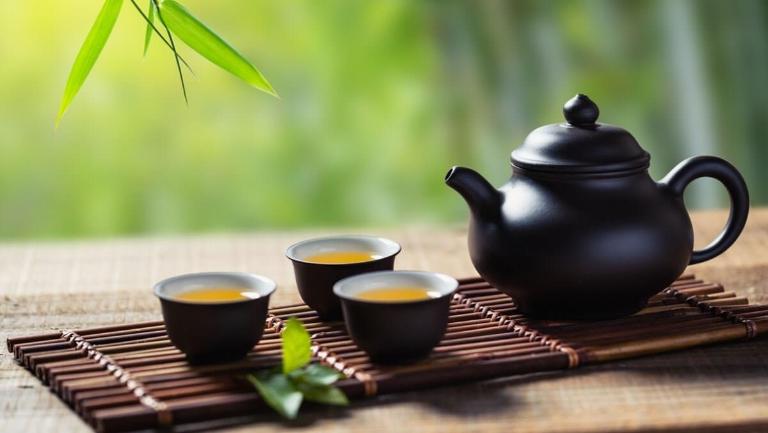
History of Vietnamese Tea
Vietnamese tea has a complex and rich narrative that matches the tea leaves themselves. From its early days to its present popularity as a cherished drink, tea has been essential in Vietnamese social and cultural fabric.
Tea in Vietnamese Dynasties
Deeply entwined with the dynasties of Vietnam, the history of tea in the nation stretches over a thousand years. Chinese traders brought the habit together with tea plants during the Tang Dynasty (618–907 AD), hence introducing tea drinking to Vietnam. Tea was completely incorporated into Vietnamese society by the Lý Dynasty (1009–1225 AD), usually drank during royal events and presented to visitors as a token of welcome.
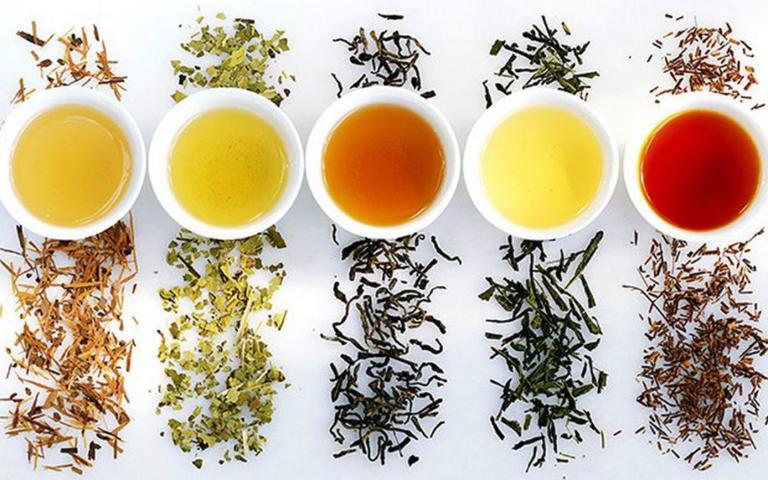
Tea was also regarded as a luxury good among the nobles during this age since it represented sophistication and rank. With poets and academics typically writing songs while enjoying their brews, the skill of tea making became the center of attention at cultural events. Tea was more than simply a beverage; it was a source of inspiration and a way to show love and respect of nature.
Influence of Chinese Tea Culture
Vietnamese tea culture has much of Chinese influence. Vietnam first embraced Chinese tea traditions and types, which greatly influenced how Vietnamese tea is drank now. For millennia, the Chinese techniques of preparing and growing tea established the benchmark; many Chinese tea varieties gained popularity in Vietnam.
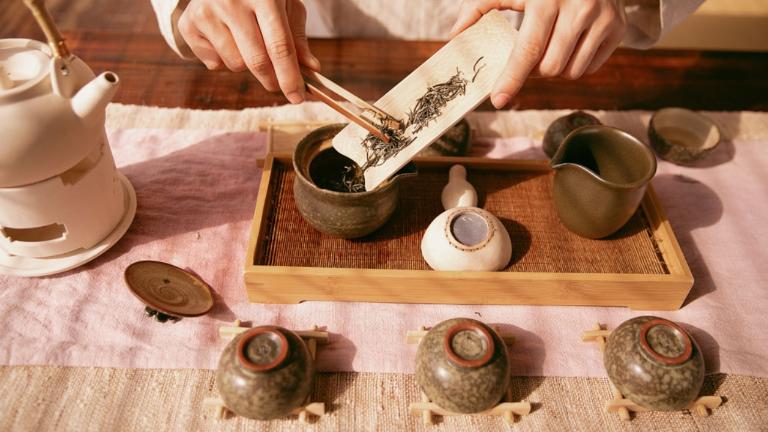
Vietnamese tea, on the other hand, developed into its unique form gradually even though it drew much on Chinese techniques. Vietnamese tea ceremonies, for instance, stress simplicity and peace whereas more formal Japanese tea ceremonies highlight different aspects.
The Tea Plantations of Vietnam
With lush green fields spreading over hills and valleys creating some of the best teas you can find, Vietnam boasts some of the most beautiful tea estates on Earth. The special topography of the nation, varied temperatures, and good soil quality make tea growing perfect.
Northern Regions (Thai Nguyen, Moc Chau)
The backbone of Vietnam’s tea business is found in northern regions such Thai Nguyen and Moc Chau. Thai Nguyen is especially well-known for their green tea, which celebrates strong flavor and premium leaves. The hilly nature of the area offers the ideal elevation for tea farming; colder temperatures serve to improve the taste characteristics of the tea leaves.
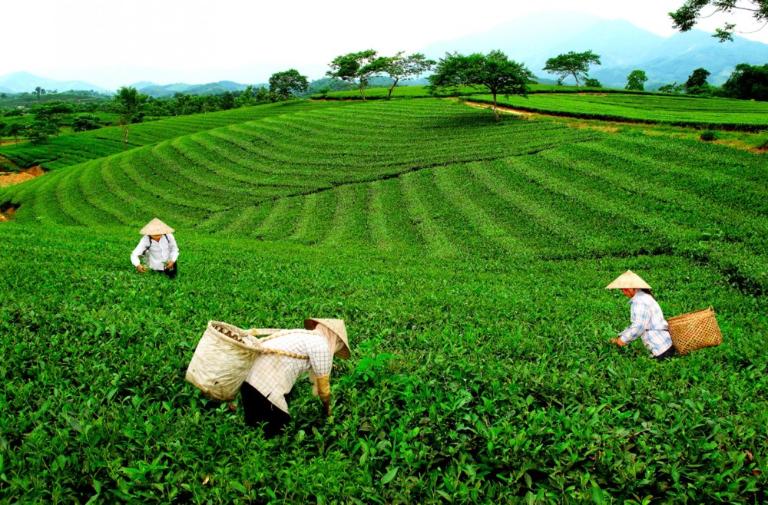
Renowned for its ethnic diversity and breathtaking scenery, Moc Chau boasts unusual tea kinds that capture the local way of life. Here, the nearby ethnic groups are growing the traditional shao ting—specialized selections of tea leaves. Often mixed with terraced fields, the visually arresting scene created by the tea farms here attracts both photographers and visitors.
Central Highlands (Lam Dong, Bao Loc)
The tea farms change in character as we head south toward the Central Highland. Higher heights and colder temperature in places like Lam Dong and Bao Loc create the ideal setting for both black and green teas. Attractive to many palates, the tea here often has a softer taste than the more powerful northern types.
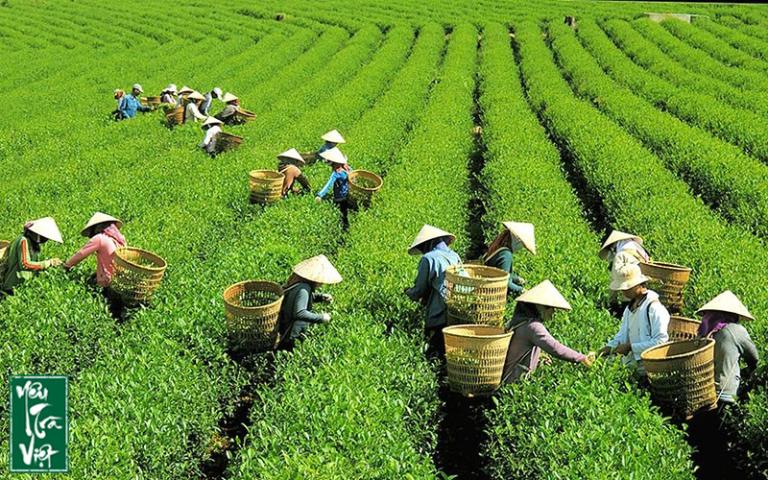
Lam Dong’s undulating hills are dotted with tea plants and intermingled with coffee farms to produce a stunning mix of greeneries. Particularly well-known for its black tea, Bao Loc has developed a devoted following from its smooth, somewhat sweet flavor. Many of the tea farms here are excellent models of environmentally friendly cultivation since they use sustainable techniques.
Exploring the Top 7 Must-Try Vietnamese Tea
Vietnam is a veritable gold mine of many tea kinds, each with unique taste and aroma. Their mild and delicate taste, which captures the rich tea tradition of the nation, is one uniting quality among all these teas.
1. Vietnamese Green Tea (Tra Xanh)
Almost everywhere in Vietnam, you can buy Vietnamese green tea, usually presented by neighborhood stores with knowledge of the ideal brew techniques. Usually displaying a light green or golden color, this tea has a palate-dancing, rather moderate taste.
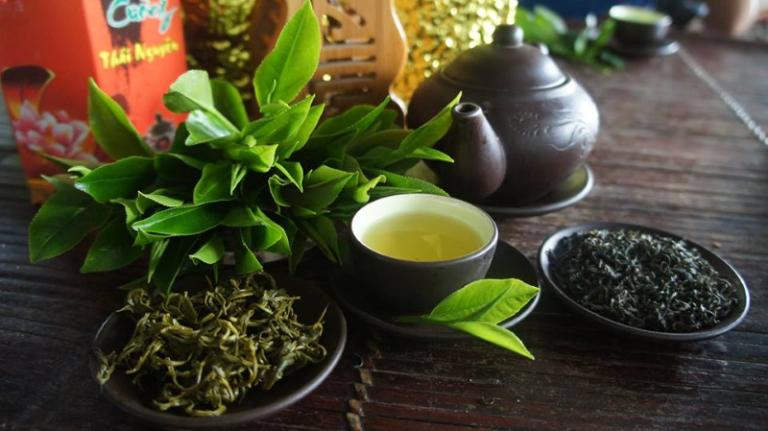
Green tea distinguishes itself in manufacture by totally avoiding oxidation. This careful procedure guarantees that green tea keeps a lot of antioxidants, hence it is not only a delicious drink but also a healthy one. Whether drank in a busy market or a peaceful tea house, green tea captures the core of Vietnamese tea tradition.
2. Vietnamese Black Tea (Tra Den)
Vietnamese black tea has a strong and full-bodied taste by means of a total oxidation process unlike that of its green equivalent. Its hue ranges greatly from a warm light brown to a deep, rich scarlet. Those who value a stronger brew will find this kind of tea ideal; some black teas have a very rich and thick taste that enthralls the senses.
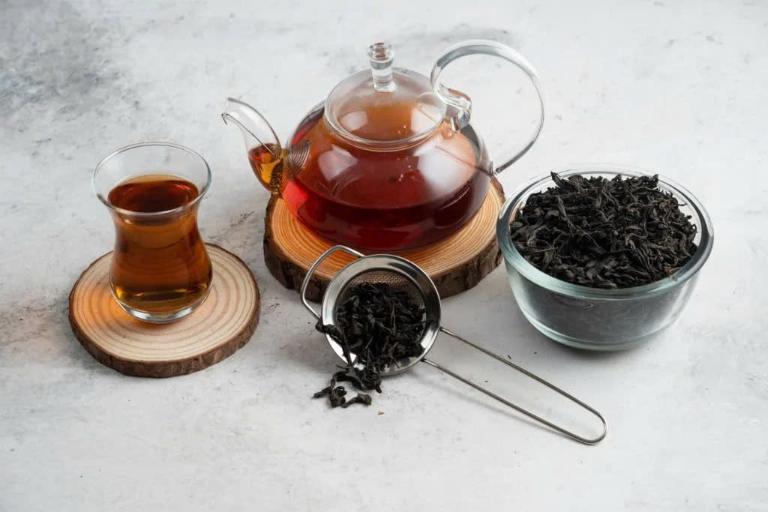
>>> Experience the Essence of Shan Tuyet Tea in Ha Giang
3. Vietnamese Ginger Tea (Tra Gung)
Packed in medicinal qualities, ginger is a beloved ingredient in Vietnamese cuisine known for its many health advantages. Commonly adding ginger to hot tea, Vietnamese people create a calming drink especially helpful for relieving nausea, flu, colds, and stomachaches. A cup of ginger tea drank one to two hours before travel will help people prone to motion sickness tremendously.
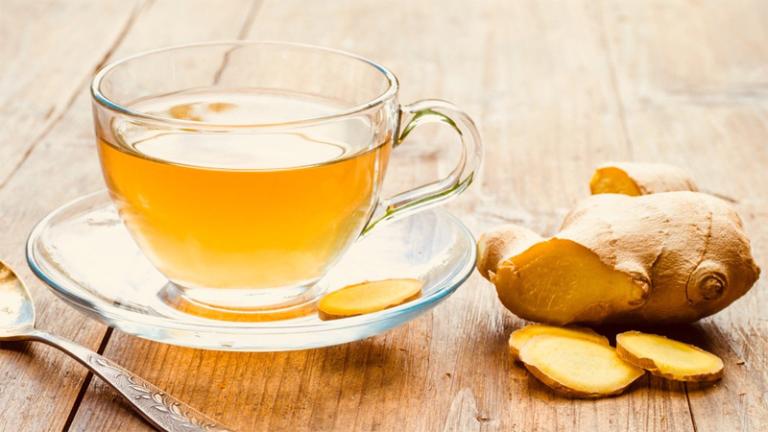
4. Vietnamese Oolong Tea (Trà Oolong)
Considered as one of the most complex teas to create, Vietnamese oolong tea is a real labor of love. The painstaking procedure consists in several rounds of oxidation and rolling that provide a wonderful scent and a complicated range of flavors. Often advised for beginners to the world of tea, oolong tea has a mild introduction that is both pleasing and fulfilling with its clean, buttery taste. Every sip reveals a different complex taste that represents the handwork of the artist behind it.
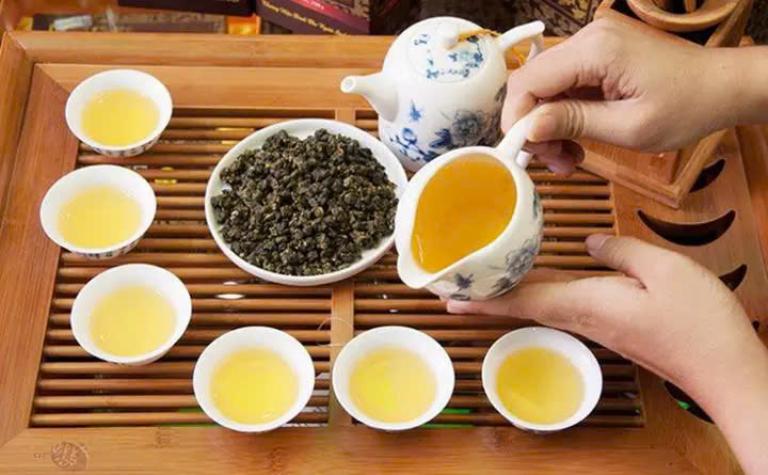
5. Vietnamese Lotus Tea (Tra Sen)
High-quality green tea leaves are placed within a lotus flower in this traditional tea making process so they may absorb their delicate scent over night. Lotus tea should be refrigerated for at least two months before use if you want best taste and scent since cold storage improves its qualities and produces a really beautiful cup.
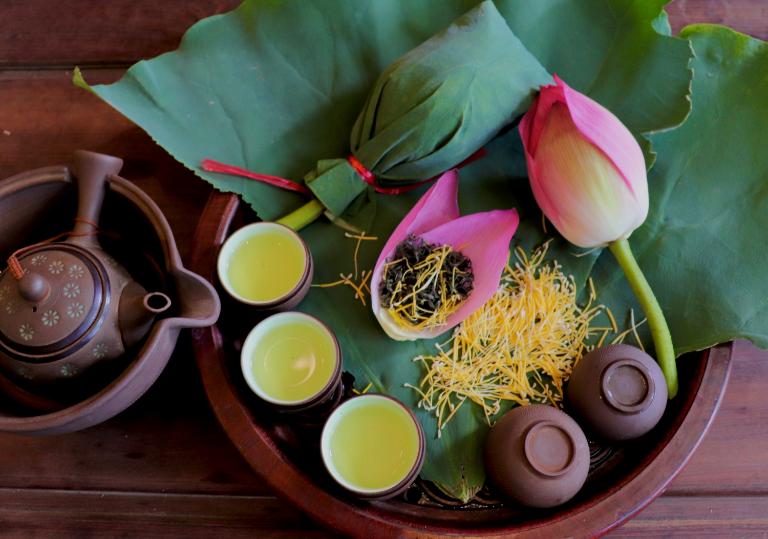
6. Vietnamese Artichoke Tea ( Tra Hoa Atiso)
There are two different kinds of artichokes tea. Made from artichoke blossoms, the first has a sweet, nutty taste and a beautiful yellow hue. Made from artichokes, the second kind presents a darker look and a contrasting bitter taste.
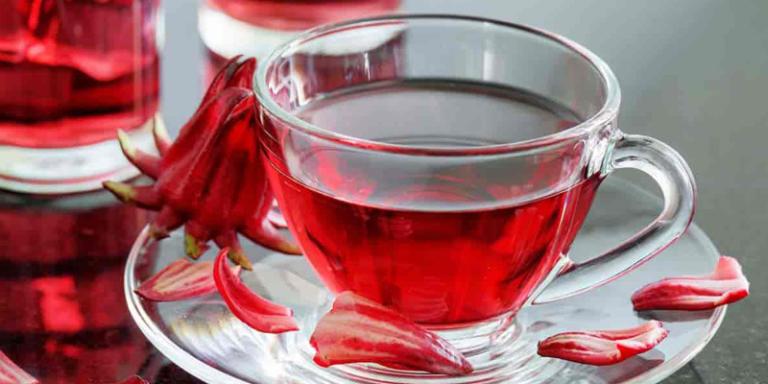
7. Vietnamese Jasmine Tea ( Tra Hoa Nhai)
Made by putting fresh jasmine blossoms amongst several times freshly collected green tea leaves, jasmine tea in Vietnam is a delightful treat. Perfect for individuals looking for a sensory adventure, this labor-intensive technique produces a very aromatic tea with a strong flavor sensation.
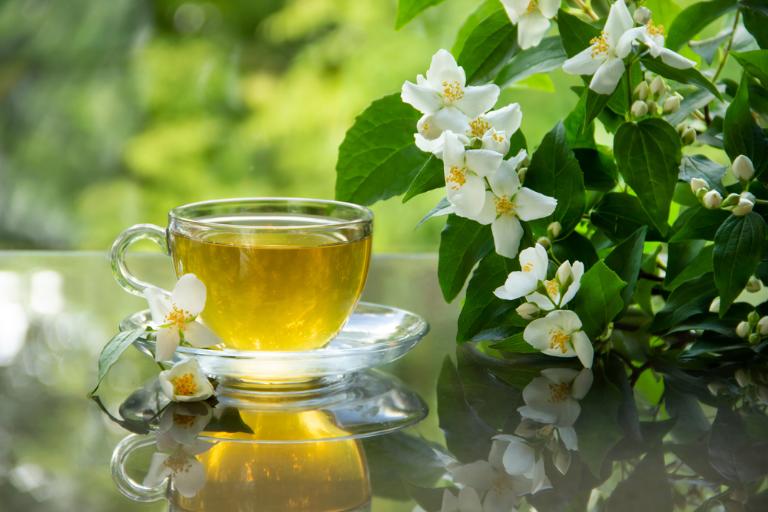
>>> Explore Vietnamese Drinks: Top 15 Local Beverages to Quench Your Thirst
Health Benefits of Vietnamese Tea
Savoring a cup of Vietnamese tea has many amazing health benefits. This drink is a great elixir for well-being, not only a custom.
Stay Hydrated and Rejuvenated
Given its high water content—even more so than many other beverages— Vietnamese tea is one of the main drinks that helps the body stay hydrated. Regular tea drinking helps preserve ideal hydration, which benefits skin condition by means of which it becomes more radiant and young. Beyond only cosmetic advantages, tea guarantees a well-functioning metabolism, so assuring that every body system runs harmonically and effectively.
Combat the Effects of Aging
Packed in antioxidants, Vietnamese tea provides a natural anti-aging agent. These strong molecules assist the body neutralize free radicals, therefore lowering cellular damage and eliminating dangerous poisons. This not only slows down the outward indicators of aging but also nourishes and revitalizes the body from inside, so enabling you to feel and look younger for longer.
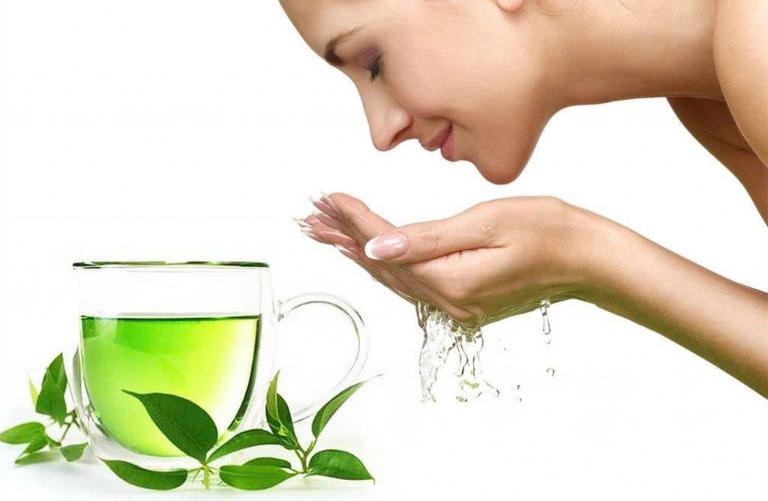
Relieve Stress and Boost Mental Clarity
Vietnamese tea provides a mild and soothing approach to fight stress and improve cognitive ability because of its caffeine level. Although it has caffeine, it is in less amounts than coffee, so it is a more balanced choice for people trying to increase mental alertness. A daily tea habit can help with short-term memory, stress release, and a more steady nervous system boost.
Protection Against Common Diseases
Regular drinking of Vietnamese tea has been connected to lowering of various prevalent diseases’ risk. Studies show that it helps to lower blood pressure and reduce the danger of blood clots, both of which are absolutely vital in avoiding heart disease. Additionally, specific molecules present in tea have been demonstrated to lessen the incidence of many malignancies, including prostate, lung, and breast cancer, delivering important long-term health protection.
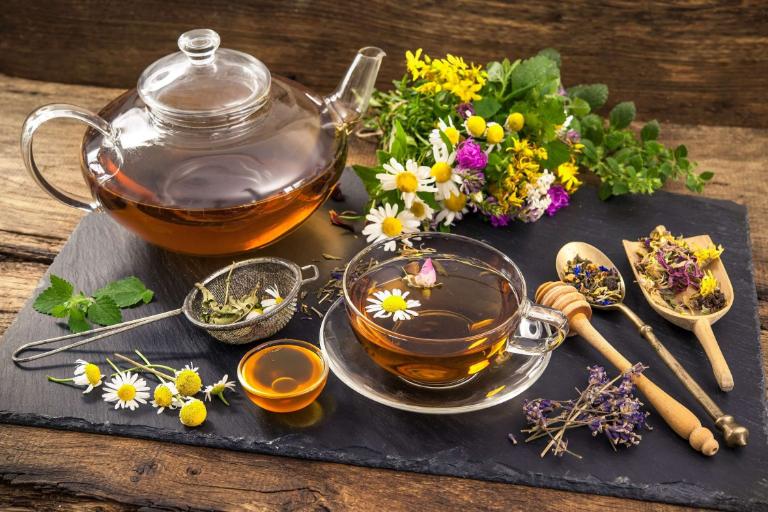
Vietnamese tea is a vivid tapestry created from sustainability, health advantages, history, and culture. Every sip of lotus tea or the strong flavors of green tea from the north transports you throughout Vietnam’s varied customs.
Related Posts:







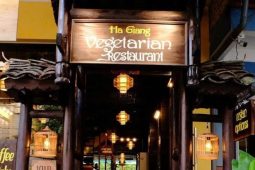
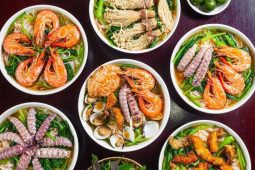

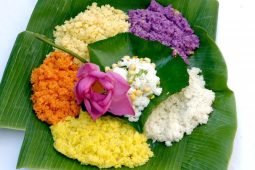
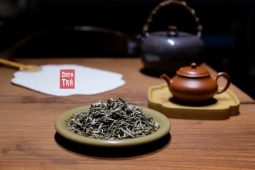
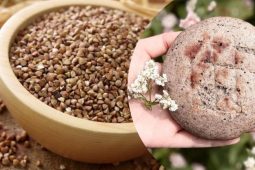
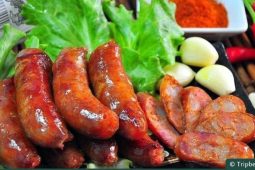
Be the first to comment!